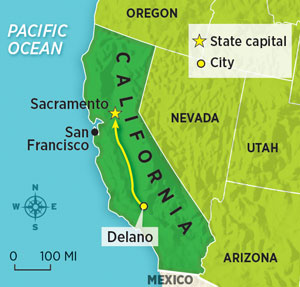Narrator B: Meanwhile, on September 8, 1965, the Agricultural Workers Organizing Committee (AWOC), a union of mostly Filipino-American farmworkers, begins a strike of the Delano vineyards.
Larry Itliong: Our members won’t harvest any more grapes until their pay is raised to at least $1.40 an hour. If the AWOC sticks together, the growers will meet our terms.
Philip Vera Cruz: There’s just one problem. Mexican-American farmworkers are still harvesting grapes. As long as they’re working, the growers don’t need us. They’ll never agree to our demands.
Itliong: True. We need to get all the grape pickers on board. Many of the Mexican-American workers are part of Chavez’s union. Maybe he can convince them to join us.
Narrator C: The AWOC meets with Chavez, hoping to get the much-larger NFWA on its side.
Itliong: Cesar, we need your help. A strike is the only way to show growers that our workers deserve better conditions and pay. But we can’t do it alone.
Vera Cruz: To force the growers to meet our demands, we need you and the NFWA to strike with us.
Cesar Chavez: We’ll join you, as long as no violence is used. We’ll keep pressure on Delano, but let’s focus our efforts on one of the largest growers instead of trying to hit all of them. Schenley Industries has more than 3,000 acres of vineyards and employs hundreds of migrant workers. If we can make Schenley cave, nearby growers might follow suit.
Itliong: That sounds like a plan.
Chavez: I’ll start by reaching out to local church leaders and college students. If we tell them about the farmworkers’ situation, they might join us. The more folks on our side, the stronger our strike will be.





